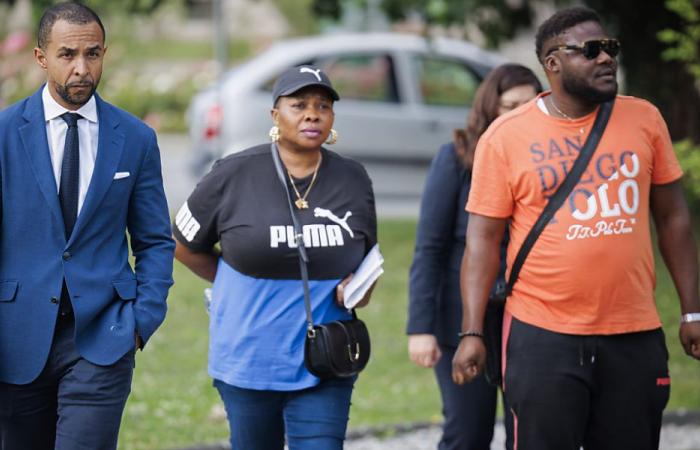At the appeal trial of six Lausanne police officers, acquitted at first instance in the case of the death of Mike Ben Peter, the cantonal court reviewed the facts and actions of the police intervention on Tuesday. The judges grilled the officers at length.
In the Renens cantonal courtroom, in front of numerous journalists and members of the public, the police officers once again told their version of the facts in light of the questions from the Court of Appeal. Namely the violent arrest of Mike Ben Peter, on the evening of February 28, 2018, near the Lausanne train station during a drug check, and his death the following day.
The scene of the arrest with blows to the genitals and ribs, the use of pepper spray, the prone position, the handcuffing, the six police officers holding Mike Ben Peter on the ground, the loss of consciousness and the cardiac massage, was once again recounted through the answers of the six police officers to the three judges, on the second day of the trial.
Offensive interrogation
Little or no new facts emerged during this hearing, with the six officers not providing versions or testimonies that differed from the trial at first instance. On the other hand, the Court of Appeal’s questioning was particularly pointed, much more insistent on many points, not to say more offensive, than during the first trial in June 2023.
For example, the judges questioned the police officers at length on the proportionality of the force used and the length of time they were held on the ground, or on the interpretation of “cries of pain”, “of suffering”, “rather very loud”, according to witnesses, versus “cries of irritation”, “of opposition”, “not so loud”, “moans”, according to the police officers.
The Court also questioned the officers about “leadership” during the intervention: who was in charge, who gave the instructions? Who could have given the order to lift the victim or stop the prone restraint? The answer was often “each responder”, even though there was a patrol leader, who was the first to arrive on the scene.
Can’t release the pressure?
The officers all stressed Mike Ben Peter’s “very agitated” and “oppositional” attitude, even during his prone and handcuffed position, face down on the ground. Several noted an “impressive physical force deployed throughout the arrest”. Hence his continued position until he lost consciousness.
At no time do they believe they made any false gestures during the arrest. All reaffirm that they never put pressure on his back or neck, nor put weight on his rib cage, being aware of the risk of positional asphyxia (DAP).
Was there no way to release the pressure, to turn the man over, to change his position, to sit him down or to stand him up again?, the judges insisted several times. No, the police officers replied. And it was only when they finally noticed that “something was wrong”, that he was “groaning and moving less and less”, that he was “out of breath”, that the police officers put him on his back to perform cardiac massage.
“No, I didn’t think he was having trouble breathing,” said one. “We’re human beings, we’re not robots: if we had seen warning signs, a health problem, we would have acted differently,” defended another.
Abuse of authority?
As a reminder, in June 2023, after four days of an already sensational trial, the Lausanne Criminal Court ruled that the six officers who carried out this intervention could not be convicted of negligent homicide, thus following the Public Prosecutor’s Office, which had itself dropped the charge.
The judges had referred in particular to the forensic medical reports, which revealed that it was impossible to say that Mike Ben Peter had died because of the police intervention, and in particular because of the ventral restraint carried out by the police officers.
On Monday, the first day of the appeal trial and following one of the submissions from the lawyer for the victim’s family, the cantonal court announced that it reserved the right to retain a new aggravation, namely abuse of authority (punishable by five years in prison), in addition to the question of negligent homicide (three years in prison).
The trial continues on Wednesday with closing arguments. The verdict is expected next Monday.
This article was published automatically. Source: ats






